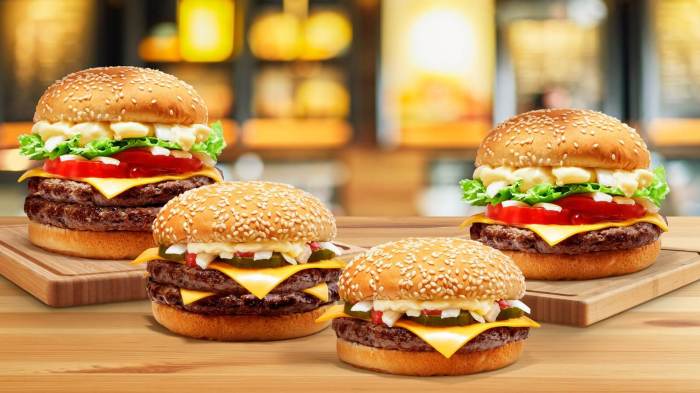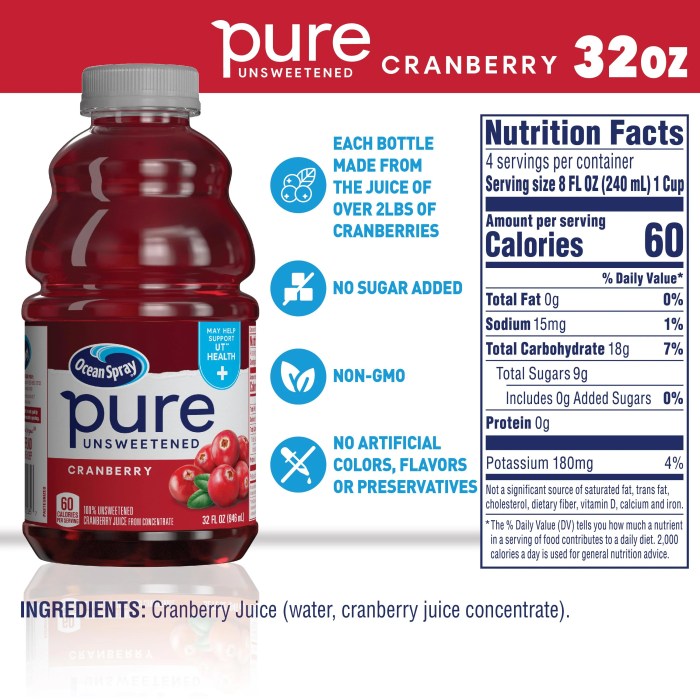Nutritional Information Overview: Burger King Double Cheeseburger Nutrition Facts

Burger king double cheeseburger nutrition facts – Understanding the nutritional content of a Burger King Double Cheeseburger is crucial for making informed dietary choices. This section provides a detailed breakdown of its macronutrients and micronutrients, along with comparisons to variations and its impact on a daily diet.
The nutritional values can vary slightly depending on preparation and location, so it’s always best to check the nutritional information panel available at your local Burger King restaurant or on their website. The values presented below are averages based on typical preparations.
Double Cheeseburger Nutritional Content
The following table presents the approximate nutritional content of a standard Burger King Double Cheeseburger:
| Nutrient | Amount | % Daily Value | Unit |
|---|---|---|---|
| Calories | 400-450 | 20-23% | kcal |
| Total Fat | 20-25 | 30-38% | g |
| Saturated Fat | 10-12 | 50-60% | g |
| Cholesterol | 80-90 | 27-30% | mg |
| Sodium | 900-1000 | 38-42% | mg |
| Total Carbohydrate | 35-40 | 12-14% | g |
| Dietary Fiber | 2-3 | 8-12% | g |
| Sugars | 8-10 | – | g |
| Protein | 25-30 | 50-60% | g |
Note: The % Daily Value is based on a 2,000 calorie diet. Your daily values may be higher or lower depending on your calorie needs.
Nutritional Variations
Several factors can influence the nutritional content of a Burger King Double Cheeseburger. Understanding these variations helps in making more conscious choices.
- Bun Options: Choosing a different bun, such as a whole wheat bun (if available), might slightly alter the carbohydrate and fiber content. The calorie count may also be slightly different.
- Extra Cheese: Adding extra cheese significantly increases the calorie, fat, and saturated fat content. Each additional slice of cheese adds approximately 50-70 calories and a few grams of fat.
- Toppings: Adding extra toppings like bacon, onion rings, or extra sauce will add calories, fat, and sodium to the overall nutritional profile.
Impact on Daily Diet
A Burger King Double Cheeseburger, due to its high calorie, fat, and sodium content, should be considered an occasional treat rather than a regular part of a balanced diet. Consuming such a high-calorie meal frequently can contribute to weight gain and increase the risk of heart disease and other health problems. Balancing this meal with healthier options throughout the day is crucial for maintaining a healthy lifestyle.
For example, pairing this burger with a large salad and a fruit for the rest of the day could help to even out the nutritional profile of the whole day’s meals. Regular exercise is also highly recommended to offset the effects of high-calorie meals like this.
So, you’re lookin’ at the Burger King Double Cheeseburger nutrition facts, eh? Thinking about the cholesterol level, maybe? Well, before you go full-on heart attack, consider this: if you’re after something a little less artery-clogging, check out the nature’s bakery nutrition facts – might be a better bet for your nyawa, bro.
Then you can go back to contemplating that Double Cheeseburger again – after all, life’s too short for boring food, right?
Ingredient Analysis
Understanding the ingredients in a Burger King Double Cheeseburger is crucial for assessing its nutritional value and potential health impacts. This section details the ingredients, explores their individual effects, and compares them to similar offerings from competitors.
The Burger King Double Cheeseburger’s ingredient list can vary slightly depending on location and preparation, but generally includes the following:
- Two flame-broiled beef patties
- Two slices of American cheese
- Sesame seed bun
- Mayonnaise
- Ketchup
- Pickles
- White onion
Major Ingredient Health Effects
Let’s examine the major components and their potential health consequences. It’s important to remember that the overall health impact depends on factors like portion size and dietary habits.
- Beef Patties: Beef is a good source of protein and iron, essential for building and repairing tissues and carrying oxygen throughout the body. However, high consumption of red meat is linked to increased risk of heart disease and certain cancers due to saturated fat and cholesterol content. The grilling process can also introduce potential carcinogens.
- American Cheese: Provides calcium and protein, but is also high in saturated fat and sodium. Excessive sodium intake contributes to high blood pressure.
- Sesame Seed Bun: Offers carbohydrates for energy, but refined carbohydrates can lead to blood sugar spikes and contribute to weight gain if consumed excessively. Sesame seeds themselves provide some healthy fats and minerals.
- Mayonnaise, Ketchup, Pickles: These condiments add flavor but contribute to the overall sodium, fat, and sugar content. Pickles, while low in calories, are often high in sodium.
Comparison with Competitors
Comparing the Burger King Double Cheeseburger’s ingredients to similar items from McDonald’s or Wendy’s reveals similarities and differences. All three typically feature beef patties, cheese, buns, and condiments. However, variations exist in the type of beef, cheese, bun, and specific condiments used, leading to slight differences in nutritional profiles. For instance, McDonald’s might use a different type of cheese or bun, affecting the overall fat and carbohydrate content.
Wendy’s may use a different blend of spices or seasonings on their patties. A direct nutritional comparison requires checking the specific nutritional information provided by each restaurant for their respective double cheeseburgers.
Comparison with Other Menu Items

Understanding the nutritional profile of the Burger King Double Cheeseburger requires comparing it to other popular items on their menu. This allows for a more informed decision about its place in a balanced diet and helps to contextualize its nutritional content within the broader range of Burger King offerings. This comparison will focus on calorie, fat, and protein content, key indicators of overall nutritional value.
The following table provides a comparison of the Double Cheeseburger with the Whopper and Chicken Fries, highlighting differences in macronutrient content. Note that nutritional values can vary slightly depending on location and preparation.
Nutritional Comparison of Burger King Menu Items, Burger king double cheeseburger nutrition facts
| Item | Calories | Fat (grams) | Protein (grams) |
|---|---|---|---|
| Double Cheeseburger | 420-480 (approximate, depending on variations) | 22-28 (approximate, depending on variations) | 25-30 (approximate, depending on variations) |
| Whopper | 660-750 (approximate, depending on variations) | 40-50 (approximate, depending on variations) | 28-35 (approximate, depending on variations) |
| Small Order Chicken Fries | 260-320 (approximate, depending on variations) | 16-22 (approximate, depending on variations) | 10-15 (approximate, depending on variations) |
As the table demonstrates, the Whopper significantly surpasses the Double Cheeseburger in calories and fat content, reflecting its larger size and richer ingredients. The Chicken Fries, while lower in protein than the Double Cheeseburger, offer a comparatively lower calorie and fat option. The variations in calorie and macronutrient counts for each item are due to factors such as variations in ingredients and portion sizes.
The Double Cheeseburger in a Larger Meal Plan
The Double Cheeseburger can be incorporated into a larger meal plan at Burger King, but careful consideration of overall calorie and macronutrient intake is crucial. For example, pairing the Double Cheeseburger with a side salad instead of fries can help reduce the overall fat and calorie count of the meal. Alternatively, opting for a smaller side of fries or sharing an order with a friend can help control portion sizes.
Choosing a healthier beverage, such as water or unsweetened iced tea, instead of a sugary soda also significantly impacts the nutritional value of the entire meal. Ultimately, the Double Cheeseburger’s suitability within a larger meal plan depends on individual dietary needs and preferences.
FAQ Resource
Can I customize my Double Cheeseburger to reduce sodium or fat?
Yes, you can request modifications like removing cheese, using a different sauce, or opting for lettuce wraps instead of a bun to lower fat and sodium.
Are there any allergens I should be aware of in the Double Cheeseburger?
Common allergens like milk (in the cheese), soy (in some sauces), and wheat (in the bun) may be present. Check the Burger King allergen information for the most up-to-date details.
How many grams of saturated fat are in a Double Cheeseburger?
The exact amount varies slightly depending on preparation, but it’s generally a significant portion of the daily recommended intake. Check the nutritional panel for the specific amount.
Does Burger King offer a healthier alternative to the Double Cheeseburger?
Yes, they offer salads, grilled chicken sandwiches, and other options with lower calorie and fat counts. However, always check the nutritional information for individual items.








